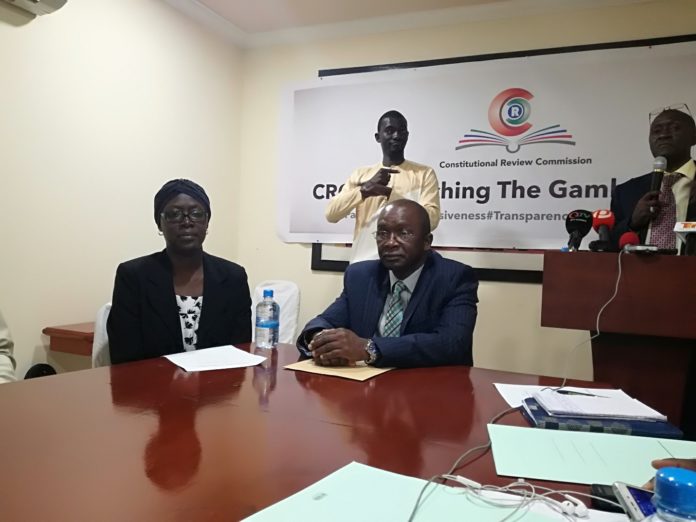Abdoulai G. Dibba
The Constitutional Review Commission (CRC), expects to commence engaging the Gambian public, from October this year. The information was revealed by the Chairperson of the Commission, Sulayman Jallow on Thursday 30th August 2018, at the Commission’s Secretariat at Futurelec Building on Bertil Harding Highway in Kotu. Regarding public consultation, Justice Jallow said the process will include liaising with all stakeholders, such as various civic, professional, religious, youth and other interest groups and associations, including political parties, the Executive, Legislature and Judiciary, as well as the general public.
“The consultations will involve, among others, inviting written contributions, responses to questionnaires, focus and thematic reviews, face-to-face dialogue and contributions through the CRC website (ie when established),” he stated.
He went on to inform the media, that the Commission envisages a consultative process as part of the review that would involve all stakeholders including communities, in the length and breadth of the country; that a pre-consultation with traditional leaders and Governors, expected to be undertaken in September, should encourage mobilisation and greater participation of the people and would give them strong assurance, that their opinions and contributions matters in the Constitution making process. Justice Jallow asserted that in-country public consultations will be done in phases, at District and Ward levels with a view to engaging the population, and thus make the process as inclusive and participatory, as possible; that the consultative process would also incorporate the views and aspirations of Gambians living in the Diaspora, and will cover some countries in Africa, Europe, Canada, the Middle East and some states in the United States of America.
“We have finalised work on the list of venues for the public consultations, which we expect would provide advance notice to the general public, to enable them make appropriate plans to engage the CRC,” he noted.
Regarding challenges to the Commission, Justice Jallow asserted that pursuant to the CRC Act 2017, the funds of the Commission are to consist of monies appropriated to the Commission by the National Assembly, and donations received from any lawful source approved by the Minister.
The Commission he said, through support from the Attorney General’s Chambers and Ministry of Justice, has established two independent CRC Bank accounts with the Central Bank of the Gambia.
“Considering the short window of eighteen months within which we are to deliver, it is crucial that the Commission’s work is not hampered by unnecessary bureaucratic processes and procedures, which have the potential to slow down the progress of our work. This is also recognised by the Attorney General and Minister of Justice, who is working tirelessly to ensure the objective of financial independence and a better facilitation of the work of the Commission is achieved,” he informed he media.
Financial resources the CRC Chairperson went on to say, will be one of the biggest challenges the Commission will have to grapple with, in order to implement its Action Plan, carry out interface consultations with the Gambian public at home and abroad, and to run the Secretariat.
Justice Jallow indicated that the timeframe for consultations is from October 2018, to June 2019, and that they would therefore, like to solicit the cooperation of the Media in particular, and the citizenry in general, to help them meet this target. “We will create different avenues for Gambians to get involved in the process, including through the Commission’s website which we expect to be established shortly,” he posited.
Regarding the Action Plan, Justice Jallow informed the media that it covers strategies on communication, research, public consultation, civic education, monitoring and evaluation, as well as a desk review of the 1965 Independence Constitution Order, 1970 and 1997 Constitutions and their amendments, a review of Constitutions of select countries and relevant regional and international instruments.
Responding to questions on the mechanism in place to help the people have elementary knowledge of the Constitution in order for them to participate effectively in the review process, Justice Jallow said they are engaging the National Council for Civic Education (NCCE) as well as the radio, television and other media outlets, to inform the public in order for them to make an inform choice.


















